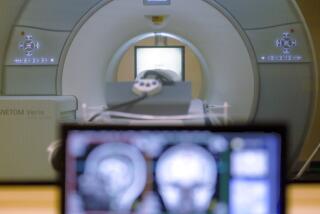When ‘Mind Over Matter’ Doesn’t Work
- Share via
Last month a patient with a perforated intestine left the hospital. He should have gone to surgery. Instead, he went to the mountains.
“Ronnie” seemed a kind, decent guy. He seemed smart too.
Smart except for one thing, that is. He knew he was sick, but deep down he believed his medical problems were partly in his mind.
For years, Ronnie had suffered bouts of nausea, vomiting and cramps due to partial bowel obstruction, a temporary stoppage of the gut. Once or twice a year, an attack got so bad he came to the hospital for IV fluids and intestinal suction. Then, within days, the crisis passed, and Ronnie went home.
No one fully understood what caused Ronnie’s attacks, but most of his doctors figured he had an old scar or adhesion that now and then trapped a loop of bowel. Or some underlying gut disease yet undiagnosed.
Ronnie had another theory. He thought his obstruction was stress-induced. If only he could master his emotions, he told me with a fleeting facial grimace, he wouldn’t be in the hospital in the first place.
Already he’d tried a slew of anti-stress remedies: meditation, herbal teas, tranquilizers, even seizure drugs. More than once, he’d also quit jobs to escape stress. And still the attacks came.
These days medicine is rife with mind-body research. Most doctors view it with an open mind as long as treatments are safe. Ronnie’s doctors were no different--open to any approach that might help.
But last month, a new mind-body anti-stress treatment wasn’t about to help Ronnie. When he came to the emergency room this time, his intestine had not merely blocked, it had burst.
Ronnie’s abdominal CT scan told the story. In addition to dilated loops of bowel, it showed inflamed membranes and puddles of fluid. Ronnie had other clues as well for an infectious spill: fever, increased white cells in his bloodstream and--eavesdropping through the stethoscope--an ominously quiet belly.
The evidence pointed to one verdict: Ronnie needed surgery. But he would have none of it. Years earlier, he had an exploratory operation and, from his perspective, look where it got him.
Fortunately, Ronnie did consent to IV antibiotics, which worked their usual magic. Within days, his fever edged down, his abdomen softened and his white cells dropped--proof he was now winning the war against infection. Then, because he planned to retreat to the mountains, he switched to oral antibiotics and ordered his first real meal.
That was the day he and I met. It should have been a courtesy call, since I was seeing patients for a colleague and Ronnie was scheduled for discharge that afternoon.
But when I walked into his room, I found a patient with a warm forehead and a lunch gone cold. After placing my stethoscope on his middle, with its few-and-far between pings, I hurried to see Ronnie’s latest CT scan. Unchanged--and still bad. Listening to the story, a senior radiologist rolled her eyes. Her next remark gave me chills. If this guy thought he had problems before, she said, just wait until his intestine scars down this time, referring to fresh adhesions that could easily form after the recent battle in his belly.
I visited Ronnie once more that afternoon. With new fervor, I urged him to stay or--at the very least--to return to the hospital at the first sign of trouble. I also warned that stopping treatment now could worsen his attacks down the line. Ronnie heard my pleas and nodded, but I could tell his heart was somewhere else--maybe on that picturesque peak above the clouds, where he still hoped for healing.
I don’t know what became of Ronnie, but today, recalling his case, my heart goes out to him. Over the years, he’s one of several patients I’ve met who tried to conquer physical illness through mental discipline and stress reduction. Sadly, that’s not the way it always works. Whether or not stress is a factor, physical complications are an everyday fact of life in medicine. True, a positive outlook can be a powerful weapon. But when such complications occur, as often as not, opting for mind over matter rather than standard treatment simply makes matters worse.
*
Claire Panosian Dunavan is an internist and infectious diseases specialist practicing in Los Angeles. She can be reached at drclairep@aol.com. The Doctor Files runs the fourth Monday of each month.





